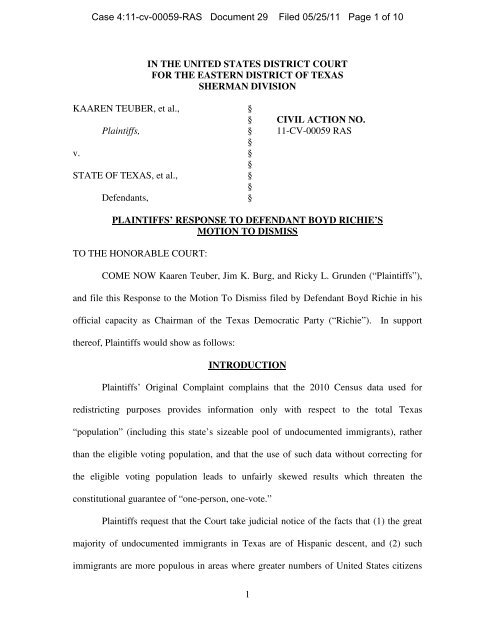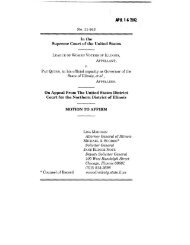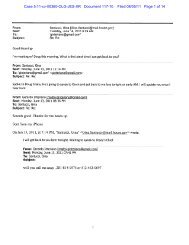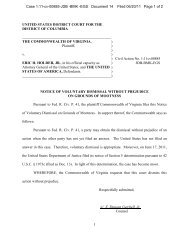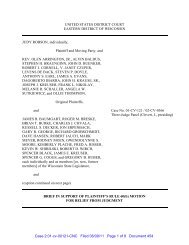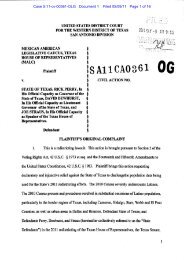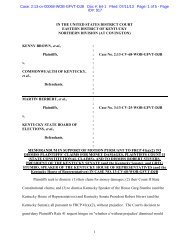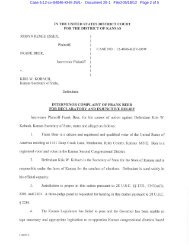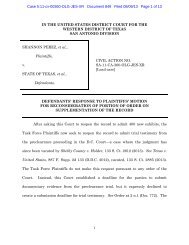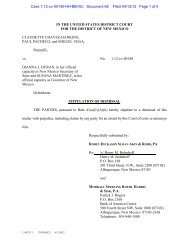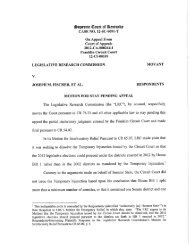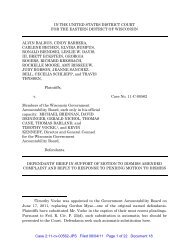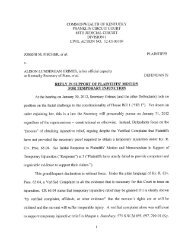Case 4:11-cv-00059-RAS Document 29 Filed 05/25/11 Page 1 of 10
Case 4:11-cv-00059-RAS Document 29 Filed 05/25/11 Page 1 of 10
Case 4:11-cv-00059-RAS Document 29 Filed 05/25/11 Page 1 of 10
Create successful ePaper yourself
Turn your PDF publications into a flip-book with our unique Google optimized e-Paper software.
<strong>Case</strong> 4:<strong>11</strong>-<strong>cv</strong>-<strong>00<strong>05</strong>9</strong>-<strong>RAS</strong> <strong>Document</strong> <strong>29</strong> <strong>Filed</strong> <strong>05</strong>/<strong>25</strong>/<strong>11</strong> <strong>Page</strong> 1 <strong>of</strong> <strong>10</strong><br />
IN THE UNITED STATES DISTRICT COURT<br />
FOR THE EASTERN DISTRICT OF TEXAS<br />
SHERMAN DIVISION<br />
KAAREN TEUBER, et al., §<br />
§ CIVIL ACTION NO.<br />
Plaintiffs, § <strong>11</strong>-CV-<strong>00<strong>05</strong>9</strong> <strong>RAS</strong><br />
§<br />
v. §<br />
§<br />
STATE OF TEXAS, et al., §<br />
§<br />
Defendants, §<br />
PLAINTIFFS’ RESPONSE TO DEFENDANT BOYD RICHIE’S<br />
MOTION TO DISMISS<br />
TO THE HONORABLE COURT:<br />
COME NOW Kaaren Teuber, Jim K. Burg, and Ricky L. Grunden (“Plaintiffs”),<br />
and file this Response to the Motion To Dismiss filed by Defendant Boyd Richie in his<br />
<strong>of</strong>ficial capacity as Chairman <strong>of</strong> the Texas Democratic Party (“Richie”). In support<br />
there<strong>of</strong>, Plaintiffs would show as follows:<br />
INTRODUCTION<br />
Plaintiffs’ Original Complaint complains that the 20<strong>10</strong> Census data used for<br />
redistricting purposes provides information only with respect to the total Texas<br />
“population” (including this state’s sizeable pool <strong>of</strong> undocumented immigrants), rather<br />
than the eligible voting population, and that the use <strong>of</strong> such data without correcting for<br />
the eligible voting population leads to unfairly skewed results which threaten the<br />
constitutional guarantee <strong>of</strong> “one-person, one-vote.”<br />
Plaintiffs request that the Court take judicial notice <strong>of</strong> the facts that (1) the great<br />
majority <strong>of</strong> undocumented immigrants in Texas are <strong>of</strong> Hispanic descent, and (2) such<br />
immigrants are more populous in areas where greater numbers <strong>of</strong> United States citizens<br />
1
<strong>Case</strong> 4:<strong>11</strong>-<strong>cv</strong>-<strong>00<strong>05</strong>9</strong>-<strong>RAS</strong> <strong>Document</strong> <strong>29</strong> <strong>Filed</strong> <strong>05</strong>/<strong>25</strong>/<strong>11</strong> <strong>Page</strong> 2 <strong>of</strong> <strong>10</strong><br />
<strong>of</strong> Hispanic descent likewise reside. With this foundation in place, let us assume two<br />
Texas districts, X and Y, each holding 700,000 persons—the approximate, ideal size <strong>of</strong><br />
Congressional House Districts based on the 20<strong>10</strong> Census—and having an adult (i.e.<br />
voting age) population <strong>of</strong> 400,000. Let us further assume that <strong>25</strong>% <strong>of</strong> the population <strong>of</strong><br />
District X (with many Hispanic citizens) is made up <strong>of</strong> undocumented immigrants,<br />
compared to only 5% <strong>of</strong> the population <strong>of</strong> District Y (with far fewer Hispanic citizens).<br />
Accordingly, despite the equality <strong>of</strong> their total populations and residents <strong>of</strong> voting age,<br />
the actual voting-eligible population <strong>of</strong> District X is 300,000, whereas that <strong>of</strong> District Y is<br />
380,000. Given that each <strong>of</strong> these Districts elects a House representative, it is clear that<br />
each vote in District X is <strong>of</strong> proportionately greater weight than one cast in District Y.<br />
All three Plaintiffs herein currently reside in congressional districts with<br />
comparatively low populations <strong>of</strong> both Hispanic citizens and undocumented immigrants<br />
and are, therefore, harmed by the application <strong>of</strong> the 20<strong>10</strong> Census data. In their lawsuit,<br />
Plaintiffs request scrutiny <strong>of</strong> the challenged methodology <strong>of</strong> using Census data to draw<br />
congressional districts, naming as defendants herein every relevant link in the procedural<br />
chain from data to district, including the federal <strong>of</strong>ficials responsible for generating the<br />
Census data, the “State Defendants” who are utilizing it for redistricting purposes, and<br />
the “Party Defendants” such as Richie who will conduct primary elections within the<br />
districts drawn using the Census data. As set out below, Plaintiffs’ claims are ripe, and<br />
Plaintiffs’ Original Complaint does not fail to state a claim upon which relief may be<br />
granted.<br />
2
<strong>Case</strong> 4:<strong>11</strong>-<strong>cv</strong>-<strong>00<strong>05</strong>9</strong>-<strong>RAS</strong> <strong>Document</strong> <strong>29</strong> <strong>Filed</strong> <strong>05</strong>/<strong>25</strong>/<strong>11</strong> <strong>Page</strong> 3 <strong>of</strong> <strong>10</strong><br />
ARGUMENT<br />
1. Legal Standards<br />
At page 3 <strong>of</strong> his Motion, Richie states that he seeks dismissal pursuant to both<br />
FRCP 12(b)(1) (alleging lack <strong>of</strong> subject matter jurisdiction), and FRCP 12(b)(6) (failure<br />
to state a claim).<br />
As to Richie’s FRCP 12(b)(1) challenge, because Richie has mounted only a<br />
“facial” attack, this Court must accept the allegations in Plaintiffs’ Complaint as true, and<br />
must construe them most favorably to Plaintiffs. See 2 Moore’s Federal Practice (3rd<br />
ed.) §12.30[4] (citing Vander Zee v. Reno, 73 F.3d 1365, 1368 (5th Cir. 1996)).<br />
Accordingly, dismissal on 12(b)(1) grounds is proper “only if it appears beyond doubt<br />
that [Plaintiffs] can prove no set <strong>of</strong> facts which would entitle [them] to relief.” Vander<br />
Zee, 73 F.3d at 1368; Naranjo v. Univ. Surety, 679 F. Supp. 2d 787, 792 (S.D. Tex.<br />
20<strong>10</strong>).<br />
As noted in 2 Moore’s Federal Practice (3 rd ed.) §12.30[4], Richie’s Rule 12(b)(6)<br />
motion is likewise decided on a highly similar standard, under which this Court must<br />
accept “all well-pleaded facts as true, viewing them in the light most favorable to the<br />
plaintiff.” In re Katrina Canal Breaches Litig., 495 F.3d 191, 2<strong>05</strong> (5th Cir. 2007).<br />
Moreover, to survive a Rule 12(b)(6) dismissal motion, Plaintiffs need only plead<br />
“enough facts to state a claim to relief that is plausible on its face.” Bell Atlantic Corp. v.<br />
Twombly, 550 U.S. 544, 570 (2007). Finally, in bringing a Rule 12(b)(6) challenge, it is<br />
Richie who bears the burden <strong>of</strong> pro<strong>of</strong>. Jennings v. AT&T Mobility, 2009 U.S. Dist.<br />
LEXIS <strong>11</strong>7316, at *6-7 (E.D. Tex. 2009). For all these reasons, Fifth Circuit courts have<br />
repeatedly held that motions to dismiss under Rule 12(b)(6) are viewed with disfavor and<br />
3
<strong>Case</strong> 4:<strong>11</strong>-<strong>cv</strong>-<strong>00<strong>05</strong>9</strong>-<strong>RAS</strong> <strong>Document</strong> <strong>29</strong> <strong>Filed</strong> <strong>05</strong>/<strong>25</strong>/<strong>11</strong> <strong>Page</strong> 4 <strong>of</strong> <strong>10</strong><br />
are rarely granted. Lormand v. US Unwired, Inc., 565 F.3d 228, 232 (5th Cir. 2009);<br />
Lowrey v. Texas A&M Univ. Sys., <strong>11</strong>7 F.3d 242, 247 (5th Cir. 1997). 1<br />
2. Ripeness<br />
Richie argues that the Plaintiffs’ Complaint should be dismissed on ripeness<br />
grounds, citing numerous decisions (which largely appear to be both unreported and<br />
improperly cited) dismissing suits filed before Texas state <strong>of</strong>ficials had completed—or at<br />
least been given the opportunity to complete—the redistricting process.<br />
Two <strong>of</strong> the four districts that are subject to Plaintiffs’ Complaint—the<br />
Congressional House Districts and the Texas State Board <strong>of</strong> Education Districts—are not<br />
subject to any ongoing redistricting process. House Bill 600 in the 82nd Legislature has<br />
been enacted as law, and is based on the very population data that Plaintiffs allege in this<br />
lawsuit violates various federal and state constitutional provisions and statutes.<br />
Similarly, the 82nd Legislature is not enacting any law to replace the current<br />
Congressional House Districts, which are also based on the type <strong>of</strong> population data that<br />
Plaintiffs allege in this lawsuit violates various federal and state constitutional provisions<br />
and statutes, and which districting also undisputedly dilutes Plaintiffs’ vote given that 32<br />
such districts are in existence when the 20<strong>10</strong> Census data creates an entitlement to 36<br />
districts. Ripeness is determined at the time a challenge thereto is adjudicated, and not at<br />
1<br />
Richie misstates the law applicable to Rule 12(b)(1) and (6) motions by citing Scheuer v.<br />
Rhodes, 416 U.S. 232, 236 (1974), in support <strong>of</strong> his assertion that this Court “must also dismiss the claims<br />
if the Plaintiffs are unable to present evidence to support their claims.” The Court in Scheuer said no such<br />
thing. See id. at 236. As noted by the Supreme Court in Scheuer, precisely because such Rule 12(b)<br />
motions take place “before the reception <strong>of</strong> any evidence,” “[t]he issue is not whether a plaintiff will<br />
ultimately prevail but whether the claimant is entitled to <strong>of</strong>fer evidence to support the claims,” i.e., at a later<br />
stage <strong>of</strong> the proceedings. Id. Scheuer goes on to say that, “[i]ndeed, it may appear on the face <strong>of</strong> the<br />
pleadings that a recovery is very remote and unlikely but that is not the test.” Id. Thus, the Scheuer<br />
opinion reinforces the proper rule that in reviewing cases under either Rule 12(b)(1) or (6), the Court<br />
should limit itself only to the pleadings themselves. See Indest v. Freeman Decorating, Inc., 164 F.3d <strong>25</strong>8,<br />
261 (5th Cir. 1999); Vander Zee v. Reno, 73 F.3d 1365, 1368 (5th Cir. 1996). Accordingly, Richie’s<br />
present dismissal Motion is to be determined upon the contents <strong>of</strong> Plaintiffs’ Complaint alone, without any<br />
burden upon Plaintiffs to submit additional evidence.<br />
4
<strong>Case</strong> 4:<strong>11</strong>-<strong>cv</strong>-<strong>00<strong>05</strong>9</strong>-<strong>RAS</strong> <strong>Document</strong> <strong>29</strong> <strong>Filed</strong> <strong>05</strong>/<strong>25</strong>/<strong>11</strong> <strong>Page</strong> 5 <strong>of</strong> <strong>10</strong><br />
the time a suit is initially filed. Manley v. Texas, 2001 U.S. Dist. LEXIS <strong>25</strong>427, at *4-6<br />
(E.D. Tex. 2001). Therefore, all <strong>of</strong> Plaintiffs’ claims are plainly ripe with respect to the<br />
Texas State Board <strong>of</strong> Education Districts and the Congressional House Districts.<br />
The remaining two districts—the Texas Senate Districts and Texas House<br />
Districts—are, at least for the moment, 2 subject to the redistricting process. However,<br />
Plaintiffs’ claims with respect to both such districts—as redistricted—are ripe, because<br />
such claims are based on the existing 20<strong>10</strong> Census data, which is the only data available<br />
for use and, in fact, is being used in the redistricting process.<br />
Plaintiffs’ Complaint is directed at the Census data to be utilized in the<br />
redistricting process, not at the redistricting process itself. This distinction is crucial<br />
because it means that the harm complained <strong>of</strong> by Plaintiffs need not await for<br />
redistricting to be done to “ripen.” The Census data complained <strong>of</strong> by Plaintiffs has<br />
already been made available for redistricting purposes. Under Article III, Section 26 <strong>of</strong><br />
the Texas Constitution, such Census data must be used for the apportionment <strong>of</strong> the<br />
Texas House <strong>of</strong> Representatives, and unfailingly has been used for apportioning election<br />
districts for the Texas Senate as well. See Bickerstaff, Redistricting Texas, at 54 (20<strong>11</strong>).<br />
Richie, as Chairman <strong>of</strong> the Texas Democratic Party, is authorized under Texas law to<br />
hold primary elections only within these districts mapped out using the Census data.<br />
Thus, while this Court may ultimately accept or reject the merits <strong>of</strong> Plaintiffs’<br />
legal arguments, Plaintiffs, today, have legitimate and ripe claims as to (1) the current<br />
districts, which were drawn using improper data, (2) the new districts already in place<br />
using similar improper data from the 20<strong>10</strong> Census, and (3) the current redistricting<br />
process using the same improper data that will, by definition, produce unconstitutional<br />
2 Both House Bill 150 and Senate Bill 31 have been passed to enrollment.<br />
5
<strong>Case</strong> 4:<strong>11</strong>-<strong>cv</strong>-<strong>00<strong>05</strong>9</strong>-<strong>RAS</strong> <strong>Document</strong> <strong>29</strong> <strong>Filed</strong> <strong>05</strong>/<strong>25</strong>/<strong>11</strong> <strong>Page</strong> 6 <strong>of</strong> <strong>10</strong><br />
districts. There are existing flaws in existing Census data. The Texas Legislature is<br />
required to use such existing data in its current redistricting efforts, and the new districts<br />
based on the existing data will govern Richie’s conducting primary elections.<br />
Accordingly, because Plaintiffs complain <strong>of</strong> existing Census-data flaws, which will<br />
necessarily contaminate an already ongoing process, their claims are ripe.<br />
Finally, as to the ripeness <strong>of</strong> Plaintiffs’ claims regarding the currently-drawn,<br />
“old-plan” districts, it is true that other courts have dismissed such claims absent a<br />
showing that the Texas Legislature would fail to timely adopt an updated redistricting<br />
plan, thereby forcing the next election to be conducted under an obsolete prior plan. See,<br />
e.g., Manley v. Texas, 2001 U.S. Dist. LEXIS <strong>25</strong>427, at *4-6 (E.D. Tex. 2001); Mayfield<br />
v. Texas, 206 F. Supp. 2d 820 (E.D. Tex. 2001). However, unlike those cases, should<br />
Plaintiffs’ challenge herein prove successful, it would necessarily initiate a timeconsuming<br />
effort to both gather and/or tabulate corrected Census data, which process<br />
would need be completed before proper Texas redistricting efforts—itself a timeconsuming<br />
process—could then begin. See Complaint 54. Under such circumstances,<br />
it is reasonably foreseeable that the State would be unable to timely adopt a valid new<br />
districting scheme and would attempt to continue its use <strong>of</strong> its existing plan despite its<br />
being made obsolete by population growth and its being based on flawed census data.<br />
See Carstens v. Lamm, 543 F. Supp. 68 (D. Colo.) (dealing with such a scenario).<br />
Because all facts within the Complaint must be construed in Plaintiffs’ favor,<br />
dismissal on ripeness grounds is improper as to Plaintiffs’ claims regarding the districts<br />
for which all redistricting efforts have concluded and the districts currently undergoing<br />
redistricting efforts, as well as the obsolete “old-plan” districts.<br />
6
<strong>Case</strong> 4:<strong>11</strong>-<strong>cv</strong>-<strong>00<strong>05</strong>9</strong>-<strong>RAS</strong> <strong>Document</strong> <strong>29</strong> <strong>Filed</strong> <strong>05</strong>/<strong>25</strong>/<strong>11</strong> <strong>Page</strong> 7 <strong>of</strong> <strong>10</strong><br />
3. Failure To State A Claim<br />
Richie also urges dismissal <strong>of</strong> Plaintiffs’ attacks on the flawed Census data for<br />
failure to state a claim.<br />
First, Richie argues that Plaintiffs’ Complaint <strong>of</strong>fers the Court no guidance as to<br />
how the Census data should be corrected. In the first place, adjustment <strong>of</strong> Census data is<br />
a topic that has hardly gone unexplored in the redistricting context.<br />
See Texas<br />
Legislative Counsel, State And Federal Law Governing Redistricting In Texas, at <strong>11</strong>2-17<br />
(1991). Moreover, for the purposes <strong>of</strong> surviving Richie’s Rule 12(b)(6) challenge,<br />
Plaintiffs Complaint need only plead “enough facts to state a claim to relief that is<br />
plausible on its face.” Bell Atlantic Corp. v. Twombly, 550 U.S. 544, 570 (2007). Richie<br />
cites no authority suggesting that this burden is further extended to encompass spelling<br />
out precisely how the complained-<strong>of</strong> wrong is to be corrected. Rather, in bringing such a<br />
Rule 12(b)(6) challenge, it is Richie who bears the burden <strong>of</strong> pro<strong>of</strong>. See Jennings v.<br />
AT&T Mobility, 2009 US Dist. LEXIS <strong>11</strong>7316 *6-7 (E.D. Tex. 2009).<br />
As to Richie’s accompanying suggestion that Lopez v. City <strong>of</strong> Houston, 617 F.3d<br />
336, 340 (5th Cir. 20<strong>10</strong>), somehow reflects the Fifth Circuit’s disapproval <strong>of</strong> redistricting<br />
cases involving Census data, Richie fails to observe that in Lopez the matters complained<br />
<strong>of</strong> were to be resolved by the soon-to-be-released 20<strong>10</strong> Census data, whereas Plaintiffs’<br />
claims will not.<br />
Indeed, the Court in Lopez expressly states that, in the event the<br />
challenged election districts remain based on improper data, the plaintiffs will have a<br />
valid cause <strong>of</strong> action. See id. at 342.<br />
Next, Richie attempts to suggest that prior rulings both by the Supreme Court and<br />
within this Circuit have somehow definitively closed the door on the arguments made in<br />
7
<strong>Case</strong> 4:<strong>11</strong>-<strong>cv</strong>-<strong>00<strong>05</strong>9</strong>-<strong>RAS</strong> <strong>Document</strong> <strong>29</strong> <strong>Filed</strong> <strong>05</strong>/<strong>25</strong>/<strong>11</strong> <strong>Page</strong> 8 <strong>of</strong> <strong>10</strong><br />
Plaintiffs’ Complaint. In fact, the most recent <strong>of</strong> Richie’s own cited authorities, Chen v.<br />
City <strong>of</strong> Houston, 206 F.3d 502, 528 (5th Cir. 2000), concludes by stating that the<br />
exclusion <strong>of</strong> aliens for redistricting purposes was a “close question,” upon which the<br />
Supreme Court has not provided “definitive guidance.” Moreover, unlike these cited<br />
cases, Richie seeks dismissal in the Rule 12(b)(6) context, where the likelihood <strong>of</strong><br />
Plaintiffs’ success on the merits is irrelevant, unless Richie can meet his burden <strong>of</strong><br />
showing that there is no set <strong>of</strong> facts, under any possible legal theory consistent with<br />
Plaintiffs’ Complaint, that would permit recovery. Jones v. Greninger, 188 F.3d 322,<br />
324 (5th Cir. 1999); Indest, 164 F.3d at 261; Whiddon v. Chase Home Finance, LLC, 666<br />
F. Supp.2d 681, 685 (E.D. Tex. 2009) (Rule 12(b)(6) dismissal “is not a procedure for<br />
resolving contests about the facts or the merits <strong>of</strong> a case”). Because Richie has made no<br />
showing that all legal theories <strong>of</strong> recovery are foreclosed to Plaintiffs, granting Richie the<br />
highly disfavored remedy <strong>of</strong> dismissal would be improper. 3<br />
See Lormand, 565 F.3d at<br />
232; Lowrey, <strong>11</strong>7 F.3d at 247.<br />
Finally, in the unlikely event this Court should find merit in any <strong>of</strong> Richie’s Rule<br />
12(b)(6) arguments, Plaintiffs would request, in the alternative, that their Original<br />
Complaint not be dismissed, but rather that they be given the opportunity to submit a<br />
more definite statement. See Rubin v. O’Koren, 621 F.2d <strong>11</strong>4, <strong>11</strong>7 (5th Cir. 1980); see<br />
also Moore’s Federal Practice § 12.36[5] (3d ed. 1999) (citing Pardee v. Moses, 6<strong>05</strong> F.2d<br />
865, 866 (5th Cir. 1979)).<br />
3<br />
In addition, with respect to the cases cited in the Motion to Dismiss, Richie overlooks the distinction<br />
between persons who are eligible to be qualified voters (at issue here) and persons who are, in fact,<br />
qualified voters (at issue in the cited cases).<br />
8
<strong>Case</strong> 4:<strong>11</strong>-<strong>cv</strong>-<strong>00<strong>05</strong>9</strong>-<strong>RAS</strong> <strong>Document</strong> <strong>29</strong> <strong>Filed</strong> <strong>05</strong>/<strong>25</strong>/<strong>11</strong> <strong>Page</strong> 9 <strong>of</strong> <strong>10</strong><br />
CONCLUSION<br />
WHEREFORE, by reason <strong>of</strong> the arguments set forth above, Plaintiffs hereby<br />
request that:<br />
1) Richie’s FRCP 12(b)(1) Motion To Dismiss be denied in its entirety;<br />
2) Richie’s FRCP 12(b)(6) Motion To Dismiss be denied in its entirety or, in the<br />
alternative, Plaintiffs be allowed to replead any claim determined to be<br />
inadequately stated; and<br />
3) Plaintiffs be granted all other relief, whether legal or equitable, to which they<br />
may be justly entitled.<br />
Respectfully submitted,<br />
HULL HENRICKS LLP<br />
221 West 6 th Street, Suite 960<br />
Austin, Texas 78701-3407<br />
512 472-4554 telephone<br />
512 494-0022 facsimile<br />
___________________________<br />
Michael S. Hull<br />
State Bar No. <strong>10</strong><strong>25</strong>3400<br />
mhull@hhm-llp.com<br />
ATTORNEYS FOR PLAINTIFFS<br />
9
<strong>Case</strong> 4:<strong>11</strong>-<strong>cv</strong>-<strong>00<strong>05</strong>9</strong>-<strong>RAS</strong> <strong>Document</strong> <strong>29</strong> <strong>Filed</strong> <strong>05</strong>/<strong>25</strong>/<strong>11</strong> <strong>Page</strong> <strong>10</strong> <strong>of</strong> <strong>10</strong><br />
CERTIFICATE OF SERVICE<br />
I certify that on May <strong>25</strong>, 20<strong>11</strong> the foregoing document was served on all parties or<br />
their counsel <strong>of</strong> record through the CM/ECF system:<br />
Jose Garza<br />
Law Office <strong>of</strong> Jose Garza<br />
7414 Robin Rest Dr.<br />
San Antonio, Texas 78209<br />
Counsel for Intervenors Mexican American Legislative Caucus<br />
David J. Schenck<br />
Office <strong>of</strong> the Attorney General<br />
PO Box 1<strong>25</strong>48<br />
Austin, Texas 787<strong>11</strong>1<br />
Counsel for Defendants State <strong>of</strong> Texas, Rick Perry, David Dewhurst, Joe Strauss, and<br />
Hope Andrade.<br />
Chad W. Dunn<br />
Texas Democratic Party<br />
Brazil & Dunn<br />
4201 FM 1960 West, Suite 530<br />
Houston, Texas 77068<br />
Counsel for Defendant Boyd Richie<br />
/s/ Michael S. Hull<br />
Michael S. Hull<br />
<strong>10</strong>


